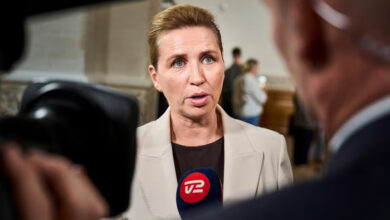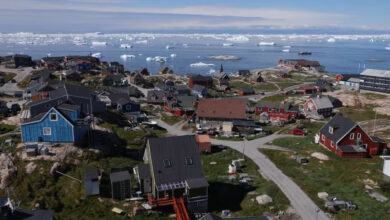Once I received an invitation from the Danish-Egyptian Dialogue Institute to visit Denmark, the first thing that came to my mind was the stereotypical stories told by any Egyptian who happens to visit Europe. I decided, at first, not to tell such stories so as not to sound like a boring broken record. But when I had a closer look, I understood why such repetitive stories were irresistible.
That “cultural shock” I experienced allows us to share both the feelings of regret and aspiration. ِPeople are not born with genes that gives them inevitable cultural characteristics. After all, those peoples’ ancestors were the Vikings!
Press freedom
On my first day in Denmark, I met with David, a fellow journalist who presented us with a full picture of how Danish media functions. The state owns the largest broadcast network, DR, one of the leading newspapers and also finances private media outlets by an average of 25 percent.
But since the state owns, or finances, the whole media network, how does Denmark top the world’s press freedoms chart?
The funds come from the Ministry of Culture, all with the aim of preserving the Danish language against an English invasion. So, any newspaper receives the finances disregarding its political orientations, even an Arabic-speaking paper issued by the Muslim community that is not meant to receive funds from the law in the first place!
The chief editors are elected by the editorial boards according to the law. Heads of state-run papers are appointed by the parliament. However, government newspapers’ boards are not changed with the change of parliament majorities so as to avoid suspicions.
Still not astonished?
In the second day we met the director of Radio24syv, who told us that a portion of society as well as MPs have a sense that too much media impartiality was harmful to the freedom of expression. State media is strictly adamant that announcers do not express their personal views, and that equal time should be given to various opinions. That prompted the parliament in 2010 to finance new broadcast so as to strike a balance by introducing highly biased anchors and programs that are out of the mainstream. Those include one Muslim announcer who advocates immigrants rights, as well as another that is anti-democracy and advocates a return to full monarchy!
This broadcast, opposed to and financed by the state, has 500,000 fans, just nearly 200,000 behind the official radio! Therefore, what we see here is not merely a freedom of opinion or media, but much more.
A high-profile Danish journalist told me that journalism should always fall in the opposition camp, adding that its role is to scrutinize the government on spending the taxes it collects from the citizens.
Taxation
Denmark imposes high taxes on corporations, standing at 59 percent maximum, but in return, it provides excellent health and education services to citizens for cheap rates. It also offers rights for businessmen, including the right to sack employees, to whom the state pays respectable unemployment benefits! We were advised to obtain a tax-free voucher to deliver at the airport and receive back the taxes we paid since we were not citizens and therefore not benefiting from the taxes we paid!
A walk in neighboring Sweden
We booked an electronic ticket just two minutes before the train’s scheduled arrival. The fast, calm and clean train speeded from Copenhagen to Malmo, Sweden. I had not seen a single police officer during the 38-minute journey! In fact, I had run into only four officers during a whole week!
Getting down the train, I discovered I had left my cell phone on my seat. Our Danish companion phoned the station officers who told us they had not receive any lost cell phones. More than an hour later, I returned to the train to find my cell phone exactly where I left it! I asked my friend why no one cared to deliver it to the lost-and-found office, she told me that it is their culture that people leave lost stuff where they are so that their owners could find them once they get back.
“Had we been in Egypt, that phone would have vanished in less than a minute,” I told her. She replied that when she was in Egypt, she had her phone stolen while she was making a call!!
Traffic
I was prepared to be shocked by the orderly traffic, but never thought that it applied to everyone: car drivers, bicycle drivers and pedestrians.
Bicycles have their own lanes and even traffic lights. Cars do not move just once the lights go green, but after making sure that the last pedestrian is entirely off the pavement! I tried it myself and intentionally lagged a little, but nobody moved till I was completely off the road!
No touching
I was not touched by anyone anywhere; not in transportation, not during shopping and not even at-relatively-crowded streets. People here make sure to keep a few meters of distance from any other person. I made my test and pretended to be having a look at the show window of some store, partially blocking the entrance. I was waiting for someone to say “excuse me,” but turned back to find a queue of few people waiting for me to step aside!
Protest regulations?
“What is that grand, awesome building”? I asked my friend. “It is the Copenhagen municipality,” she replied. “In front of it, there is the yard allocated for protesting. You just send an email (to the municipality) telling them of the date and the purpose of the protest.”
“What if nobody replies?” I asked. “That means an approval… you are making a notification, not asking for permission,” she answered.
“What if protesters get outside the designed zone and blocked a street nearby?” I asked. “If someone does that, he gets arrested, police here is very strict.”
“How long is he\she going to stay in detention?” I asked, but my friend seemed very astonished by my question. “There is no jail for protest or press violations, you just pay a fine and go home!” she said.
“Yeah, that’s really strict”, I replied sarcastically.
Denmark saw the start of its democratic transition in 5 June 1849, the day it adopted its first constitution gave exclusive voting rights for a well-off minority and maintained vast powers for the king. That was followed by 50 years of conflicts and domestic turmoil that have a successful end to the transitional period in 1901, when all citizens were granted suffrage and popular parliament election were stipulated.
Egypt started its democratic transition in 2011, if we can describe it so, yet we are still at least 150 years behind the Danish.
I started to believe in the idea that taking a flight to Europe does not merely mean a change of place, but a 100-200 year leap ahead in a time machine.




